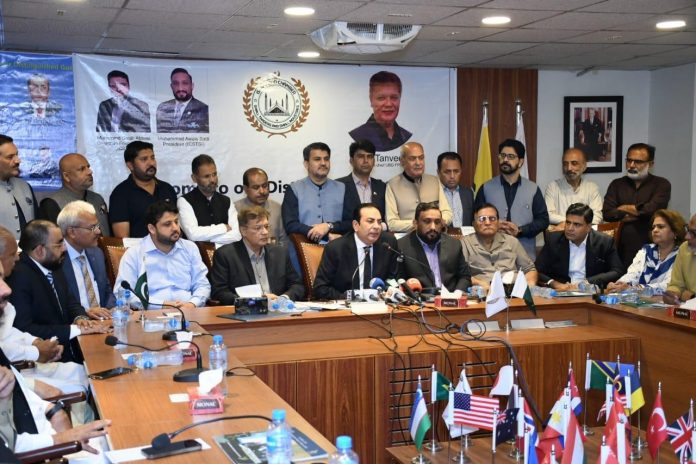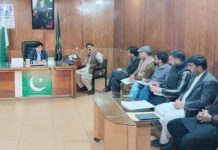Saifullah Ansar
Islamabad ( ) Patron-in-Chief of the United Business Group (UBG), S.M. Tanveer, has said that the battle for truth has been won, and now the battle for the economy must be fought. He said that they struggled against Independent Power Producers (IPPs), which led to cheaper electricity, but until the per-unit cost of electricity comes down to Rs. 26, they will not rest. Every common man, factory, and shop needs affordable electricity.
He said that with the growing population, new administrative units should be created, and local people should be appointed as in-charges according to the capacity of their respective areas. Only then will the country progress. The United States, with a population of 300 million, has 52 states, whereas Pakistan is still operating with only four provinces despite a population of 250 million. Every division must be empowered.
He was addressing a press conference yesterday at the Islamabad Chamber of Small Traders and Small Industries, accompanied by FPCCI President Atif Ikram Sheikh, UBG Secretary General Zafar Bakhtawari, UBG Central Core Committee Member Ahsan Bakhtawari, ICSSTI President Owais Satti, and Chairman Saqib Abbasi.
S.M. Tanveer said that the government has assured them that a ten-year industrial policy has been prepared, which no government will be able to alter. The people, he added, need electricity at Rs. 26 per unit to keep the economy running. Alongside creating administrative units, they must also be empowered. “If smaller provinces are to be made, then let them be created. And if administrative units are to be formed, then they must also be given authority,” he remarked.
He said China’s economy is $19 trillion, while Pakistan’s economy is very small in comparison. Pakistan has a population of 250 million but still only four provinces. Exports, including cotton, are declining because whenever the idea of building canals or barrages is raised, protests begin. Due to climate change, glaciers are melting, water is being wasted, and Pakistan is losing $20–25 billion annually just through wasted water.
Tanveer stressed that new units and provinces must be created, but all sectors should also be strengthened. On the issue of sugar, he said small traders’ strike continues. If the government provides cheap sugar, traders will also be able to sell it to the people at lower prices. He said the Pakistan Army has achieved victory against a cowardly enemy, and now traders must win the economic war.
He called for gradually reducing the interest rate from 11% to 6%, stating that the economy cannot function until the rate is lowered. “We stand with the Prime Minister and the government, but we must also correct our own mistakes. Lahore is not the whole of Punjab; other districts also need improvement,” he added.
He emphasized that Pakistan urgently needs a comprehensive and long-term industrial policy to overcome the current economic crisis. Around the world, development is based on industrialization, but unfortunately, industries have always been neglected in Pakistan. He said the government must focus not only on large cities but also on smaller cities and districts to promote industries under a District Economic Model. Through this model, local industries can be established, providing new employment opportunities for youth, reducing population pressure on big cities, and supporting both agriculture and business.
S.M. Tanveer added that the energy crisis, high interest rates, and heavy taxation have put industrialists under severe strain. If the government adopts business-friendly policies, reduces electricity and gas tariffs, and gives incentives to exporters, Pakistan can not only increase exports but also strengthen foreign exchange reserves. He said traders’ and industrialists’ voices must be heard at every level, because they are the ones who can economically move the country forward.
FPCCI President Atif Ikram Sheikh said that creating provinces based on population is inevitable. He said they fought for reducing the interest rate and for establishing an industrial policy. If administrative power is devolved to the lower level, significant improvements can be achieved. He stressed the need to take strong measures to boost exports.
He added that the real strength of Pakistan’s economy lies in small and medium enterprises (SMEs), but unfortunately this sector has always been ignored. Developed countries have always prioritized SMEs to strengthen their economies. He said the government must immediately introduce the District Economic Model, under which industries and small businesses will be promoted at the local level in every district. This will create employment for millions of youth, reduce migration to big cities, and strengthen the rural economy.

















